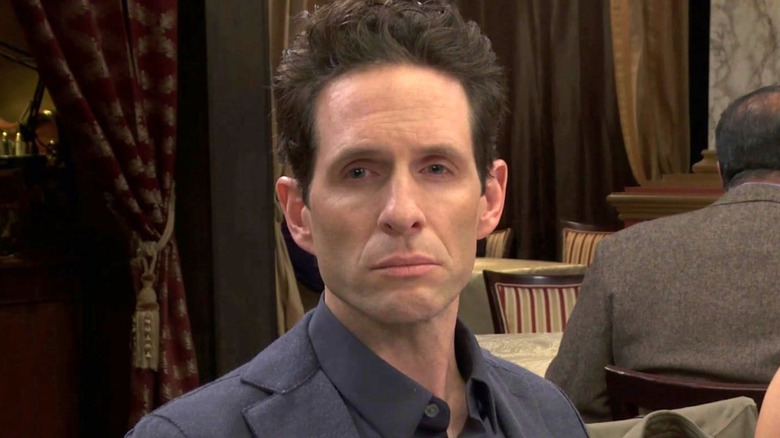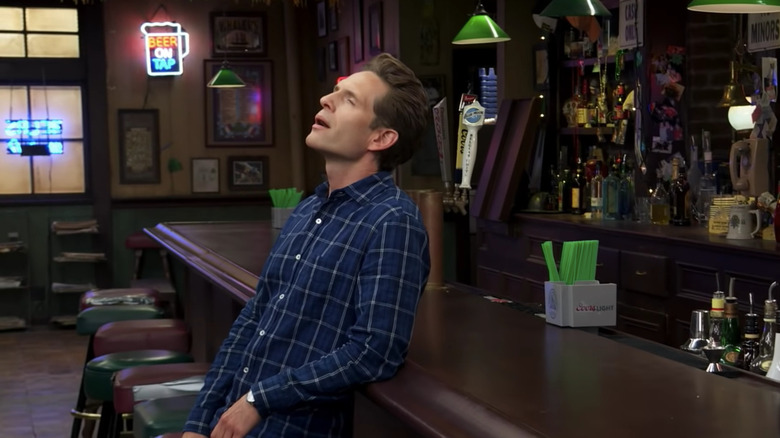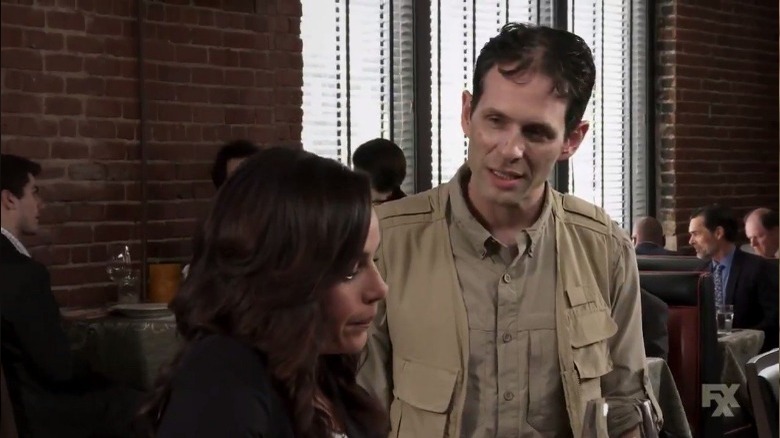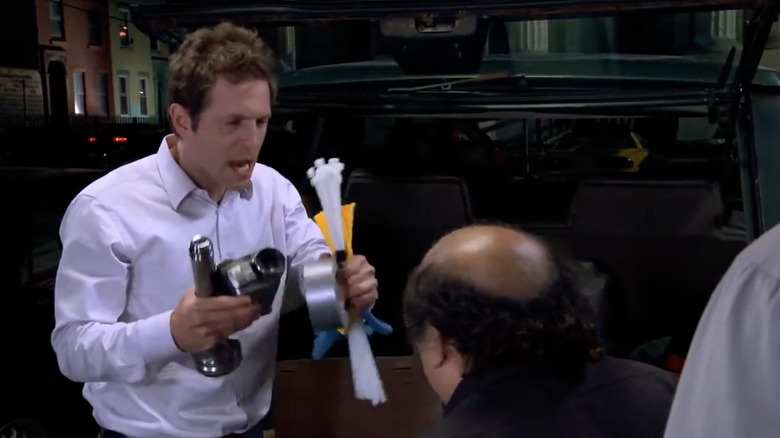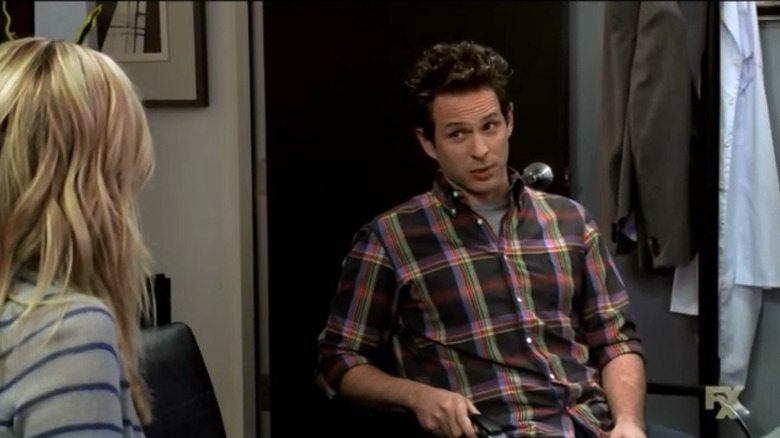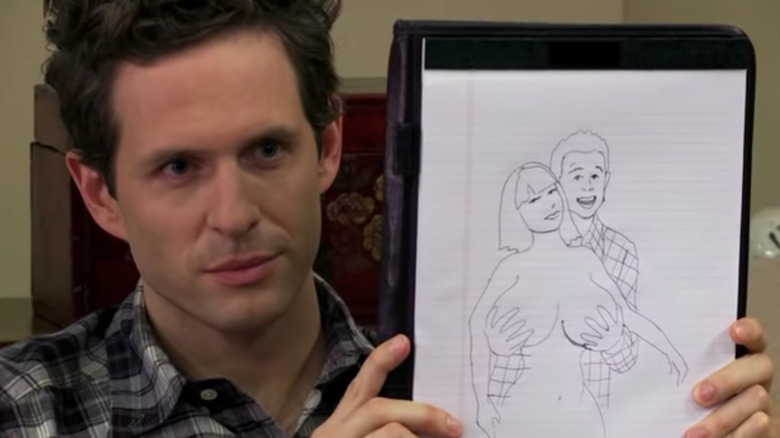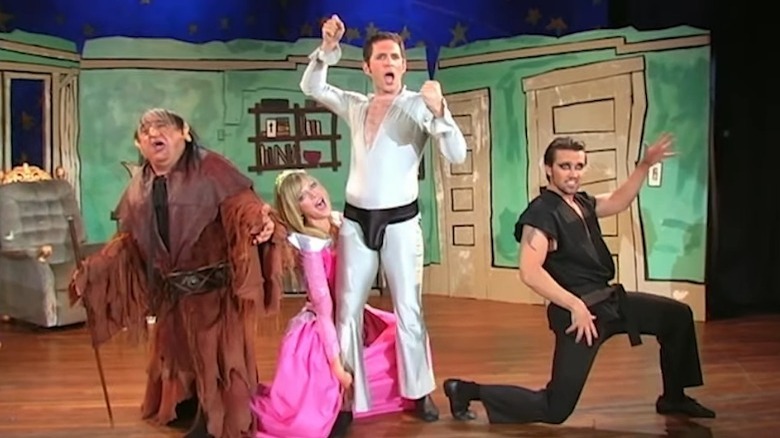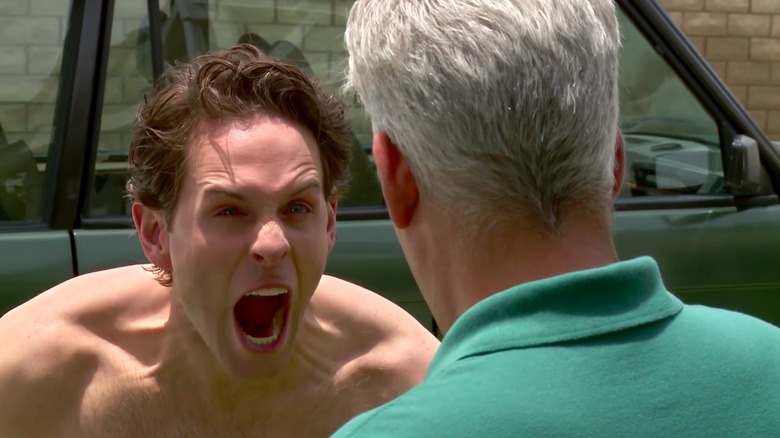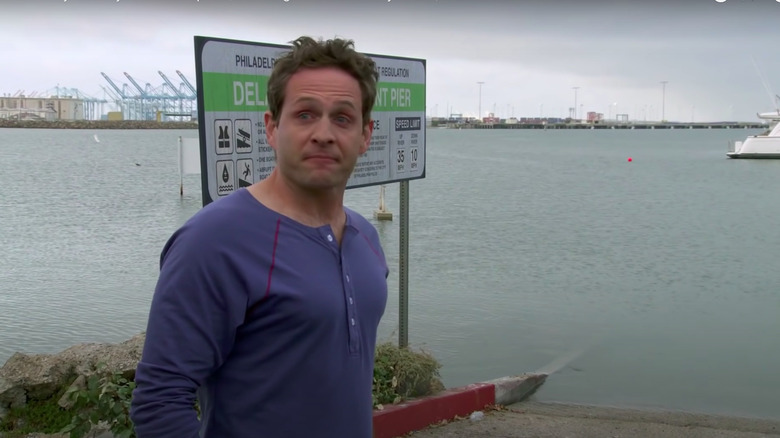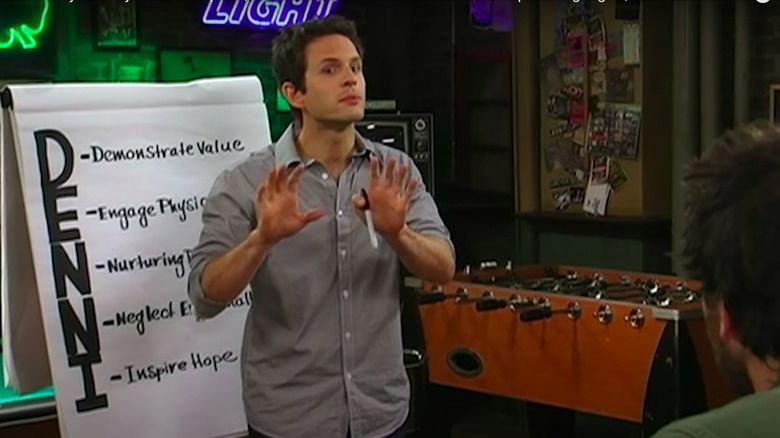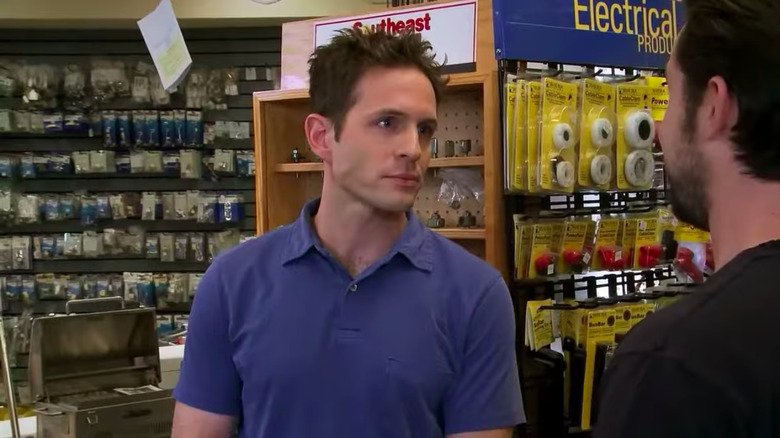The 10 Best Dennis Reynolds Moments On It's Always Sunny In Philadelphia, Ranked
As the longest running live-action comedy series in American television history, "It's Always Sunny in Philadelphia" has been pushing the boundaries of taste, depravity, and hilarity for 15 seasons. If you're somehow still unfamiliar with its debauched genius, it follows a group of friends — Charlie (Charlie Day), Mac (Rob McElhenney), twins Dee (Kaitlin Olson) and Dennis (Glenn Howerton), and the Reynolds' father, Frank (Danny DeVito) — who own a Philly pub. However, while Paddy's hosts many of the gang's antics, you're far more likely to find them embroiled in some deranged scheme than pulling pints behind the bar.
With so many episodes of "It's Always Sunny in Philadelphia" to choose from, every fan probably has their own list of favorite moments. However, while each of its stars steal scenes, it's Howerton's pitch-perfect portrayal of preening megalomaniac Dennis that may be the show's finest creation. With such a wealth of brilliantly unnerving content to sift through, this list could easily be twice as long. Still, if we have to pick the 10 best Dennis Reynolds moments, these are hard to beat.
10. Return to Paddy's
As the show's 13th season loomed in 2018, the future of "It's Always Sunny in Philadelphia" appeared to be in flux. In the previous season finale, Dennis seemed to leave the bar and the gang behind to become a husband and father to a secret family that appeared out of the blue. During a much-memed dance scene in which his freakish friends showed off their signature moves, Dennis questioned his life choices and wondered whether a drastic life change was long overdue.
Meanwhile, reality proved to be just as full of conflict. As the show's success surged, its cast struggled to juggle its commitments to the series with offers for new projects. As a result, Howerton's return to Paddy's was far from guaranteed. "It has nothing to do with my relationship to anyone one the show or Rob and Charlie or anyone like that," Howerton told Uproxx in 2017. "It's partially a creative and personal decision," he explained. "I'm certainly staying open to the possibility of doing more, but there is a possibility that I will not."
In hindsight, this might've been a bit of misdirection. Howerton wasted no time returning at the end of the 13th season premiere, much to the satisfaction of his bar buddies, who had replaced him with the super woke Cindy (Mindy Kaling) and a scarily accurate sex doll. Within seconds the group dynamic picked up right where it left off, with Dennis swiftly labeling Dee a bird and manipulating Mac with a sly jibe about his body dysmorphia.
9. Forgoing makeup
One of the biggest strengths of "It's Always Sunny in Philadelphia" is its ability to think up smart and unexpected storylines; the "themed day" episodes are perfect examples of this. In season 9, the gang had to endure Mac Day, during which Mac got to call the shots and no one could complain or do anything about it. When the third episode of season 14 arrived, it was Dee's time to shine.
While this episode focuses on the gang's sole female member, the specific form of torture that she dished out to her sibling actually delivered one of Dennis' most memorable moments. On Dee Day, Dee makes the ever-perfect Dennis ground himself by removing all of his secretly-applied makeup, revealing the wholly imperfect, drinks-too-much 40-something lurking beneath the surface.
The end result is terrifying and hilarious in equal measure. With his skin concealer, pec implants, hair paint, and neck tape banished, all that's left is a shriveled husk of the gang's one-time golden god. Gone too is Dennis's unbridled confidence and any trace of his fool-proof system for worming his way into the lives of the opposite sex, as revealed during a painful exchange with a woman that Mac and Charlie are trying to sway as part of a never-fully-revealed scam.
8. Retrieving his 'tools'
One of the most enjoyable things about watching Dennis over the years has been the sometimes subtle, sometimes not-so-subtle suggestion that he's actually a serial killer. This begins in season 3, episode 10 when he openly fantasizes about killing a waitress (Mary Elizabeth Ellis) while stalking her with Dee. Since then, there have been plenty of other hints, including Dennis' imitation of "The Silence of the Lambs" villain Buffalo Bill and the suggestion that he doesn't experience feelings. Physically, he fits the bill too. Ted Bundy, anyone?
However, one of the most obvious pieces of evidence emerges during season 7's two-part closer, "The High School Reunion Part 2: The Gang's Revenge." After being humiliated in front of his former high school classmates and shunned by the woman he's trying to woo, a furious Dennis retreats to his car (a 1993 Range Rover County — a finisher car) to retrieve his "tools" and exact revenge. However, when the rest of the gang sees him delving inside a hidden compartment, they become slightly concerned about its contents.
Is it normal to hide zip-ties, duct tape, gloves, and a video camera in the back of your car? Dennis sure thinks so — and when he's quizzed about why he carries these items around, he has an equally strange reply: "It's fetish s***. I like to bind. I like to be bound," he stammers, before shutting down the interrogation completely. "The Golden God is not taking questions!"
7. Threatening to make Dee into a suitcase
If Dennis' secret tool stash weren't enough to convince you he might be hiding something sinister, this eerie threat aimed at his own sister certainly will. It pops up part way through season 10's third episode "Psycho Pete Returns." When one of Charlie and Mac's old pals suddenly reappears, the duo are disappointed to discover that he's lost some of his edge and is no longer the uncontrollable cannibal killer they once knew. While they try to reignite his old ways, Dennis, Dee, and Frank try to get "Psycho Pete" recommitted to a psychiatric ward.
The exchange quickly devolves into a confusing mix of chaotic requests as Frank tries to track down his old friend Froggy, and Dee unleashes some of her trademark dodgy acting skills. This proves to be too much for Dennis, who flies into a simmering, snake-like rage, inadvertently revealing some of the darker sides of his personality.
"Dee, I swear you would be of more use to me if I skinned you and turned your skin into a lampshade or fashioned you into a piece of high-end luggage," Dennis chuckles. "I could even add you to my collection." When Dee asks if this means that he actually owns a collection of luggage made out of human skin, Dennis quickly fires back, "Don't be ridiculous. Think of the smell."
6. Going to therapy
When it comes to Dennis, there's one aspect of his personality that outshines all others: He's a narcissist. By season 8, this was already well-established, but when the gang heads to therapy in order to figure out whose turn it is to do the dishes, the true extent of Dennis' self-adulation doesn't just make itself known, it becomes a medical fact.
The first clue regarding just how extreme Dennis' delusion is comes seconds into his session, as he immediately makes it clear that he feels like he's on the same page as this medical professional, despite having none of her professional training or experience. "Why don't you think of me more as a peer ... in the academic sense, of course. In terms of age, you're decades older than me," he snorts, shortly after whipping out detailed dossiers on the gang that he's been adding to for years.
After revealing how he quietly manipulates the gang, including secretly feeding Mac Mexican diet pills to help him lose the weight he gained in season 7, Dennis unveils his closing argument: a bizarre doodle of himself holding the therapist's bare breasts.
5. The Dayman
One of the show's most prestigious episodes, "The Nightman Cometh," proved so popular that it even spawned its own live show, which toured America briefly in late 2009. In it, Charlie announces that he has written a musical and wants to stage it in a local theater. After renting a space and recruiting their friends to help, the gang sets about trying to make Charlie's dream a reality, only to later learn that it was all just an attempt to win the heart of the Waitress.
Although Charlie originally wrote "The Dayman" in the ninth episode of season 3 during a paint-fume-inspired creative spree, this earworm really comes into its own as one of the closing tracks of his stage play. In addition, the number provides a rare opportunity for the show to feature Dennis without highlighting his creepier personal traits.
Since then, "The Dayman" has become a much-loved (and much-quoted) piece of "It's Always Sunny in Philadelphia" lore, and even inspired a heart-warming viral moment in which a classroom full of Japanese children hosted their very own singalong. Forget gasps, these guys are going for all-out "awwws."
4. Unloading on Wally
Now we're getting into the heavy hitters. A select few scenes perfectly embody the subdued storm of a person that is Dennis Reynolds, and this is one of them. Part of one of the show's finest episodes, this moment epitomizes the bubbling rage that's constantly seething just below Dennis' calm and controlled surface, and perfectly illustrates the chaos that ensues whenever it's fully unleashed.
In the season 11 episode "Mac and Dennis Move to the Suburbs," Mac and Dennis do exactly that in order to win a bet with Frank. However, what starts as a seemingly innocent experience quickly becomes a claustrophobic nightmare as the monotony of everyday life outside of the city slowly drives the Golden God past his limit.
Dennis' road rage is worth mentioning, as his frustrated yells of "fat pig" and "cow" and his inability to comprehend why anyone wouldn't "seize the gap" raise his emotional temperature. That said, it's poor old Wally (Steve Witting) who finally pushes Dennis over the edge, thanks to his incessant questions about how it's a "hot one today, huh?" With this, Dennis' anger finally breaks free — as does his body from its clothing — as he fantasies about what it'd be like to really give Wally a piece of his mind.
3. Rage over the 'starter car'
Speaking of Dennis's temper, "The Gang Misses the Boat" contains another instance where the gang's most pristine member falls victim to his own anger. Perhaps the best thing about this moment is that it occurs in an episode where Dennis is trying his best to overcome his rage issues and redefine his personality, only to succumb to his worst instincts in the most outlandish and public way possible.
After missing a boat party and driving his prized Range Rover into a river (apparently, it's a piece of "precision British land-to-sea craftsmanship"), Dennis decides that the gang has become too weird for its own good and decides to change things up. It's this type of character trait that makes Dennis so fun to watch; he's led by a blind belief that, somehow, he's not quite as bad, damaged, or strange as the people that he voluntarily spends all of his time with. It's also the reason why this episode's big payoff is so satisfying to watch.
After a would-be buyer labels his submerged vehicle a "starter car" that's suitable only for his daughter, Dennis dramatically flips his lid, proving to audiences that it doesn't matter how much he distances himself from the gang. The Golden God will always be mere minutes away from untethering his rage and unleashing the fire of a thousand suns.
2. The D.E.N.N.I.S System
Should this be number one? It's tricky. There are plenty of "It's Always Sunny in Philadelphia" fans who will count it as their ultimate Dennis Reynolds moment. It appears in second place on our list, but it's still near the top thanks to the way it captures much of what makes Dennis so weird — here, he literally spells it out and weaves it into a creepy acronym.
On the surface, the D.E.N.N.I.S system is essentially a series of steps used to seduce any woman who takes Dennis' fancy. If that wasn't worrying enough, when Dennis starts unpacking his acronym, each step proves to be more manipulative, controlling, and cold than the last. Instructions like "Demonstrate value," "Nurture dependence," and "Neglect emotionally" are pieces of advice that you won't find on a mainstream sitcom — and that's why we love it.
Despite his best efforts to explain, the gang still fails to grasp Dennis' seedy system. However, that doesn't stop it from making a comeback in future episodes, making it one of the more enjoyable recurring jokes on the show. It even birthed comparable systems for Mac, Dee, and Frank, each of which has been employed to varying levels of success.
1. The implication
There are many strong contenders for the top spot, but in the end, this brief but memorable exchange between Mac and Dennis during the season 6 classic "The Gang Buys a Boat" has to be the best Dennis Reynolds moment. As the title of the episode indicates, this outing sees the gang purchase a boat, and they quickly let their imaginations run wild with dreams of nautical parties, oceanic exploits, and adventures at sea.
For Dennis, these fantasies naturally revolve around seducing women. However, when he explains why owning a boat will help him score, things take a dark and sinister turn. Long story short, he believes that the women attending the gang's boat parties will have no choice but to sleep with him "because of the implication" that, if they don't, something bad may happen to them while they're alone on the open sea.
"That seems really dark, though," says a confused Mac. Dennis replies, "Well, if the girl says no, then the answer is obviously no. But, the thing is, she's not gonna say no, she'd never say no, because of the implication." A quick back-and-forth ensues before Mac asks if these women are in danger, a moment that's perfectly punctuated when Dennis catches an older female bystander eavesdropping on the conversation. "You certainly wouldn't be in any danger," Dennis tells the elderly woman, leading Mac to ask, "So they are in danger?" It's since become one of the show's most-quoted moments, and tells you pretty much everything you need to know about Dennis.
